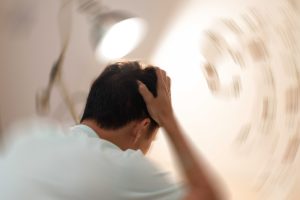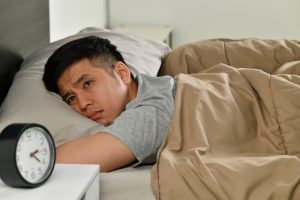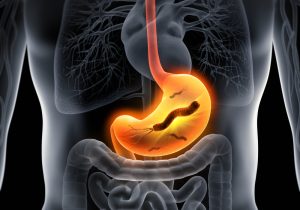What is Vertigo?
Vertigo is dizziness coupled with the sensation that the environment around is spinning. Vertigo attacks may be sudden and transient, lasting for a few seconds, or they may be chronic and sometimes debilitating, affecting daily tasks. It is a symptom of various conditions affecting the inner ear, brain or sensory nerve pathways.
Depending on the cause, other accompanying symptoms may include:
- Loss of balance
- Lightheadedness
- Headache
- A sense of motion sickness
- Nausea or vomiting
- Tinnitus (Ringing sound in the ear)
- Hearing loss
- Fullness of the ear
- Sweating
- Nystagmus (Abnormal, uncontrolled eye movements)
What are the Causes of vertigo?
Causes may be classified as Peripheral or Central. Peripheral causes involve balance mechanisms of inner ear and are most common. Central causes involve the brain.
Peripheral Vertigo
- Infection and inflammation of the inner ear
- Vestibular neuritis – inflammation of the vestibular nerve which sends information about the balance and head position from the inner ear to the brain; affects balance; results in unsteadiness, nausea and vomiting.
- Labyrinthitis – inflammation of the labyrinth (a maze of fluid-filled channels) affects congruence of signals it sends to brain versus that from the unaffected ear and eyes. This impairs both balance AND hearing; results in unsteadiness, nausea and vomiting, tinnitus and/or hearing loss.
- Symptoms may come on suddenly, and the infections (mostly viral) that cause vestibular neuritis and labyrinthitis may take a few weeks to resolve.
- Meniere’s disease
- This is a condition in which excess fluid builds up in the inner ear
- Ear pressure changes result in sudden vertigo attacks which last for hours or days, involving hearing loss, tinnitus and feeling of fullness in the ears.
- Benign Paroxysmal Positional Vertigo (BPPV)
- Occurs with specific changes to the head position e.g. while standing up, bending over or turning in bed.
- Thought to be caused by small fragments of calcium carbonate crystals which break off from the lining of the inner ear channels and enter the fluid-filled canals, sending confusing messages to the brain.
- involves short, intense, recurrent attacks of vertigo (usually lasting a few seconds to a few minutes). It is often accompanied by nausea and nystagmus.
- Medications
- A variety of medications have been reported to cause vertigo, and some are also ototoxic i.e. cause ear damage e.g. aminoglycosides.
Central Vertigo
Central vertigo results from problems with parts of the central nervous system (CNS) i.e. brain and/or spinal cord. This includes:
- Migraine
- Traumatic head or neck injury
- Stroke or transient ischemic attack (TIA), where part of the blood supply to the brain is cut off
- Multiple sclerosis – a condition where the immune system attacks the CNS
- Tumour e.g. in the cerebellum (bottom of brain), or acoustic neuroma – a rare, non-cancerous (benign) brain tumour that grows on the acoustic nerve, which is the nerve that helps to control hearing and balance
Central vertigo tends to have a more gradual onset except for acute cerebrovascular events (e.g. stroke, TIA) but may also be severe, involving neurological impairment e.g. ataxia (difficulty with balance, walking, speaking, swallowing), confusion.
How is Vertigo Diagnosed?
- Medical history
- The doctor will ask about your symptoms, onset, duration, triggers.
- Physical examination
- The doctor will use instruments to magnify and examine the ear canal and eardrum, check for signs of infection.
Besides medical history and physical examination, a series of other tests may be done depending on what the doctor suspects to be the cause. Some examples include:
- Hearing tests help doctors assess whether there is a problem with the nerve that connects the inner ear to the brain, and whether dysfunction affects both ears.
- Videonystagmography, rotation tests allow audiologists to record and interpret eye movements as you track visual targets, to confirm whether inner ear dysfunction is responsible for vertigo.
- Imaging tests: An MRI scan may be done, especially if there is hearing loss or neurological symptoms, to obtain a closer look at the inner ear and surrounding structures. This is especially useful for revealing tumours, growths, fluid build-up in inner ear.
What Are the Treatments for Vertigo?
Treatment, if any, depends on the exact cause of vertigo. The different treatment options available include
Vestibular rehabilitation
Vestibular rehabilitation is a form of “brain retraining”. It involves carrying out a series of specialised exercises which encourage your brain to rely on the signals coming from the rest of your body, such as your eyes and legs, rather than the confusing signals from your inner ear. This minimises any dizziness and helps you to maintain your balance.
Medications
Medications commonly prescribed for symptomatic relief include betahistine, antiemetics like prochlorperazine, motion-sickness pills like dimenhydrinate. If an infection causes vertigo in the inner ear, antibiotics may be prescribed to treat the infection. If fluid buildup is the main cause of vertigo, the doctor will prescribe diuretics to reduce the pressure in the ear.
Surgery
Doctors prescribe surgery if the vertigo is caused by serious conditions like a tumour or an injury to the neck or brain. In such a case, surgery is done to remove the tumour and to repair the injury.
How to Manage Vertigo?
You can take the below steps to manage vertigo.
- To reduce the spinning effect, lie down in a quiet and darkroom.
- While doing daily activities, move your head slowly and carefully.
- When you feel dizzy all of a sudden, sit down right away.
- When you wake up at night, do not jump out of bed right away. Instead, sit on the edge of the bed for some time and slowly stand up. Turn on the light to prevent falls.
- If you want to pick up something from the ground, do not bend down. Instead, squat or lower your position to pick things up.
- Avoid alcohol as it can affect balance and also dehydrate you, aggravating symptoms.
- Try to get enough sleep and relax as much as possible. Sleep deprivation, anxiety and stress can make the symptoms worse.
- Learn simple techniques for relief
- e.g. in the case of BPPV, the Epley Maneuver may help move problematic crystals out of ear canal.
- This involves a set of steps done before bed each night until the symptoms of vertigo resolve for at ≥24 hours.
- If symptoms of vertigo occur on the left side, the Epley maneuver can be done by:
- sitting on the edge of a bed and turning the head 45° to the left
- lying down quickly and facing head up on the bed at a 45° angle
- maintaining the position for 30 seconds
- turning the head halfway — 90°— to the right without raising it for 30 seconds
- turning the head and entire body to the right side, looking downward for 30 seconds
- slowly sitting up but remaining seated for at least a few minutes
- If vertigo starts on the right side, these directions should be done in reverse.
Conclusion
Vertigo is a manifestation of an underlying medical condition. If you have severe vertigo which affects your day to day functioning, it is best to consult a specialist to rule out more sinister causes and for appropriate management.












